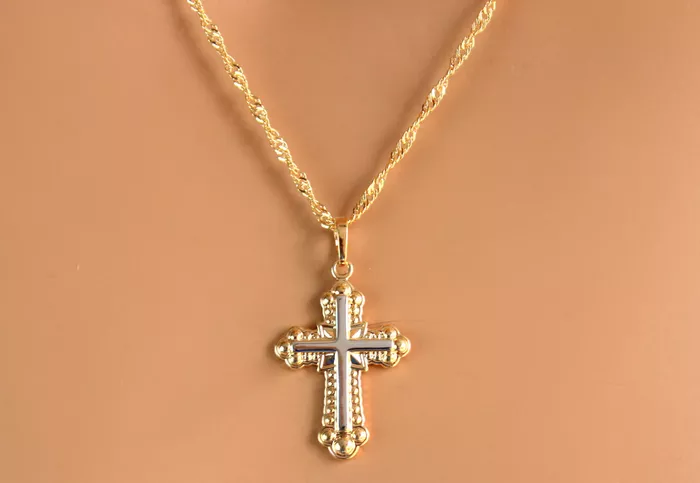Throughout history, the cross pendant has held profound significance across various cultures and religions. Its enduring symbolism transcends mere fashion, carrying deep spiritual and cultural meanings that resonate with millions worldwide. From ancient times to the present day, the cross pendant continues to be a powerful emblem of faith, identity, and personal expression.
Ancient Origins and Religious Symbolism
The origins of the cross as a symbol can be traced back to ancient civilizations, where it held different meanings across various cultures. In Egypt, the ankh symbol, resembling a cross with a loop at the top, represented life and immortality. Similarly, in pre-Christian Europe, the cross-like symbol known as the solar cross or Odin’s cross was associated with sun worship and spiritual enlightenment.
However, it was within Christianity that the cross took on its most profound and enduring symbolism. Central to Christian faith, the cross represents the crucifixion of Jesus Christ, the central event of Christian theology. For Christians, wearing a cross pendant serves as a tangible reminder of Jesus’ sacrifice and redemption, symbolizing hope, forgiveness, and eternal life.
Varieties of Crosses and Cross Pendants’ Meanings
The cross pendant comes in various forms, each with its own unique symbolism:
Latin Cross: The most recognizable form of the cross, with a long vertical bar intersected by a shorter horizontal bar near the top. It symbolizes the crucifixion of Jesus Christ and is commonly worn by Christians of various denominations.
Greek Cross: Featuring four equal arms, the Greek cross symbolizes the spreading of Christianity and is often associated with the Eastern Orthodox Church.
Celtic Cross: Characterized by a ring surrounding the intersection of the cross’s arms, the Celtic cross originated in the British Isles and combines Christian and pagan symbols, representing eternity and the endlessness of God’s love.
Orthodox Cross: This cross has three horizontal bars, with the top representing the inscription on Jesus’ cross, “Jesus of Nazareth, King of the Jews.” It is prominent in Eastern Orthodox Christianity.
Ankh Cross: Originating in ancient Egypt, the ankh cross resembles a cross with a loop at the top and symbolizes life and immortality.
See Also: Why Are Cross Pendants so Popular: Things You Need To Know
Symbolism Across Cultures and Religions
Beyond Christianity, the cross pendant holds significance in various cultures and religions:
Judaism: Although not traditionally associated with the cross, some Jewish jewelry incorporates cross-like symbols as cultural or decorative elements.
Islam: While not a symbol within Islam itself, the cross has historical and cultural significance in Islamic art and architecture, often representing peace and harmony.
Buddhism and Hinduism: In some Eastern traditions, cross-like symbols appear in religious art and architecture, although their meanings vary widely.
Secular and Fashionable Symbolism
In contemporary society, the cross pendant has evolved beyond its religious roots to become a fashion statement and symbol of personal style. Many people, regardless of religious affiliation, wear cross pendants as accessories that signify personal beliefs, values, or simply as a decorative item.
Choosing and Wearing a Cross Pendant
When selecting a cross pendant, whether for religious devotion, cultural connection, or fashion, it’s essential to consider its symbolism and personal significance. Factors to consider include:
Material: Cross pendants are crafted from various materials such as gold, silver, stainless steel, and even wood, each carrying its own symbolism and durability.
Design: Choose a design that resonates with your beliefs or personal style, whether traditional or contemporary.
Size and Proportion: Consider the size of the pendant in relation to your clothing and personal comfort. Larger pendants may be more noticeable and make a stronger statement.
Occasion: Some cross pendants are more suitable for everyday wear, while others may be reserved for special occasions or religious ceremonies.
Personal Meaning: Ultimately, the significance of a cross pendant lies in its personal meaning to the wearer. Whether as a symbol of faith, heritage, or personal identity, wearing a cross pendant should evoke a sense of connection and meaning.
Controversies and Misinterpretations
Despite its widespread acceptance, the cross pendant has occasionally been a subject of controversy and misinterpretation:
Cultural Appropriation: Wearing cross pendants from cultures or religions to which one does not belong can be seen as disrespectful or appropriative.
Fashion vs. Religion: Some argue that wearing cross pendants solely as fashion accessories trivializes their religious or cultural significance.
Political Symbolism: In certain contexts, the cross pendant has been used as a political symbol, often associated with specific movements or ideologies.
Conclusion
The cross pendant continues to be a timeless symbol with deep-rooted meanings across cultures, religions, and personal beliefs. Whether worn as an expression of faith, cultural heritage, or fashion statement, its enduring appeal lies in its ability to evoke profound emotions and connections with history and spirituality. As society evolves, the cross pendant remains a powerful emblem that transcends boundaries and speaks to the universal human experience of faith, hope, and love.

